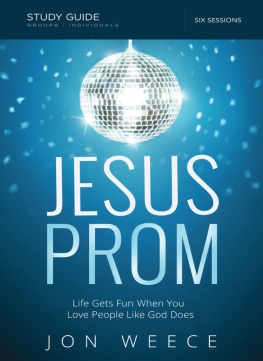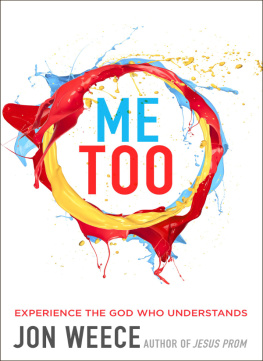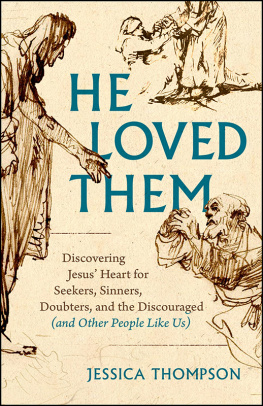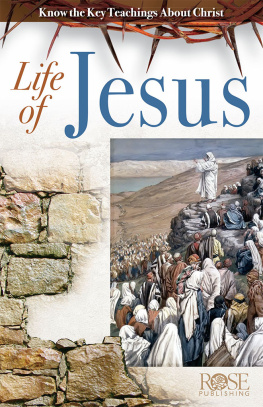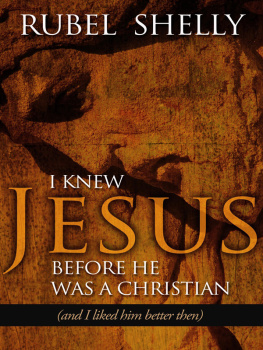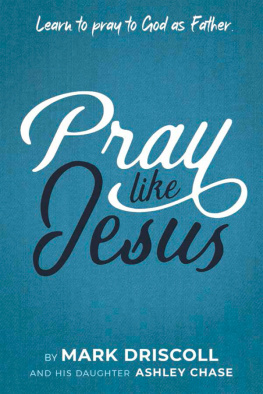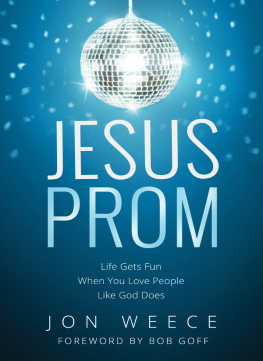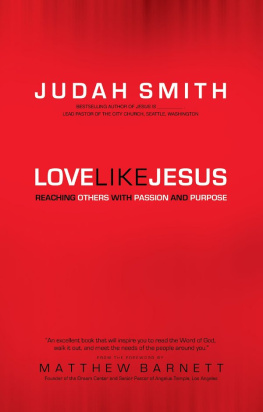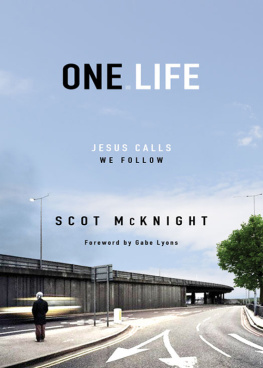
2014 by Jon Weece
All rights reserved. No portion of this book may be reproduced, stored in a retrieval system, or transmitted in any form or by any means electronic, mechanical, photocopy, recording, scanning, or other except for brief quotations in critical reviews or articles, without the prior written permission of the publisher.
Published in Nashville, Tennessee, by Nelson Books, an imprint of Thomas Nelson. Nelson Books and Thomas Nelson are registered trademarks of HarperCollins Christian Publishing, Inc.
Thomas Nelson titles may be purchased in bulk for educational, business, fund-raising, or sales promotional use. For information, please e-mail SpecialMarkets@ThomasNelson.com.
All Scripture quotations are taken from The Holy Bible, New International Version, NIV. Copyright 1973, 1978, 1984, 2011 by Biblica, Inc. Used by permission. All rights reserved worldwide.
ISBN 978-0-5291-1168-5
ISBN 978-0-5291-1208-8 (eBook)
First Printing August 2014
contents
If you live in the United States, one of the questions youre likely to hear at a dinner party is, Where do you go to church? Going to church has been part of American culture for a long time especially in the South. In fact, people sometimes use it as shorthand to describe their association with organized Christianity. I go to church or I dont go to church are ways of explaining whether or not a person is into faith, because the assumption is that church is a place where people go.
However, the phrase going to church is actually a misnomer. No one can go to church because the church is not a place. The church is people. The New Testament talks about the church as the people of God. That means the church is not a place where we go but instead is a kind of community we are. The church has its character because it does things, and what the church does speaks to what it is.
This definition begs another question: What kind of things do our churches do? When we act in our world, are we doing things that God cares about? Are we joining God in putting the broken things back together? Are we making our public life look like God looks? Or are we up to other things?
These are the questions that drive Jesus Prom. For the next six sessions, we will be exploring a half dozen different verbs. These are the verbs that define what the people of God or the church are invited to be doing in the world. Those six verbs love, be, see, dance, give, and remember are not ideas but invitations. They are a direction for being the church in the world. As such, this study is not going to be primarily about ideas but about action.
Each session will explore a different aspect of the verbs of God through the teachings and stories of Jon Weece. There will be an opening question, a little Bible study, and then youll watch Jon on video. However, the real action comes after the video is over, when you dig into each topic in a guided small-group time. During that portion of the study, your group will be invited into a practical experiment designed to put that sessions verb into practice. This section, called Being the Church, should serve as a place where the big ideas of Jesus Prom take on a flesh-and-blood reality.
Its going to be great. Really. However, if want to get the most out of your Jesus Prom experience, keep a couple of things in mind. First, the real growth in this study will happen during your small-group time. This is where you will process the content of Jons message, ask questions, and learn from others as you listen to what Gods love is doing in their lives.
This leads to point two. Small groups can be a deeply rewarding time of intimacy and friendship, but they can also be a disaster. So work to make your group a safe place. That means being honest about your thoughts and feelings as well as listening carefully to everyone elses opinions.
Third, resist the temptation to fix a problem that someone might be having or to correct someones theology. Thats not what this time is for. In addition, keep everything that your group shares confidential. All this will foster a rewarding sense of community in your Jesus Prom group and give Gods Spirit some space to heal, challenge, and send you out to do the verbs that show our world the love of God.
One last thing.
You might have wondered why this study is called Jesus Prom. The name comes from a party that Jons church throws every year for the disabled, handicapped, and mentally ill. Its a beautiful thing, and Jon speaks about it in of the study and chapter 9 of the book. Jesus Prom is something Jons community came up with to be the church in their neighborhood something they devised and created. This study is designed to help you figure out how to be creative in the same way. How can you be the church in your neighborhood? What is your Jesus Prom? Thats the question you should be asking as you move through the sessions.
So experiment, dream, and risk, but whatever you do, please dont do nothing. As Jon says, the call of God is for the church to love the verbs that God loves. So get out there, jump in with both feet, and take these words love, be, see, dance, give, remember and make them flesh!
As youll discover throughout this study, Jesus Prom is very practical. It gets out there and does things. It takes risks. Jon found out that his life got fun when he loved people like God does, so this study is designed to give you similar opportunities.
Each session in Jesus Prom begins with a mixer question followed by a reflection from the Bible. You will then watch a video clip and jump into some directed small-group discussion. Even though multiple questions are provided, dont feel that you have to use them all. Your leader will focus on the ones that resonate with your group and guide you from there.
The final component of each session called Being the Church is where this study might diverge from others you have done in the past. During this time, you and your group will engage in a hands-on exercise that puts the verb featured during the session into practice. These exercises are meant to be completed during your meeting and will be what you make of them. If you choose to only go through the motions, or if you abstain from participating in these exercises, there is less chance youll find what youre looking for during this time. However, if you stay open and take a gamble, you may discover what so many others have already found to be true: your faith will come alive when you take holy risks for God!
Now, the thought of risky activities might make some folks feel anxious. Thats okay. If you fall into this category, then just read ahead to each Being the Church section, and you will know whats coming up. Then you can prepare yourself accordingly. Remember, none of these experiments involves anything inappropriate or embarrassing. They are just hands-on opportunities to train in loving like God loves.
At the end of each session, there are three more opportunities for you to engage the content of Jesus Prom during the coming week. Jon says that love is a profound affection, put into action, so each part of this section is a variation on that theme. The first is activity-based (Affection in Action), the second is a biblical reflection (Affection in Devotion), and the third is a meditation based on a chapter from the book (Affection in Instruction). The challenge will be to do at least one of these activities between sessions and to use your study guide to record what you learn.
Starting in , you will be given time before the video to check in with your group about the previous weeks activity and process your experiences. If you could not do an activity one week, or if you are just joining the study, dont worry. Hearing what others have learned will be nourishment enough.
Next page
